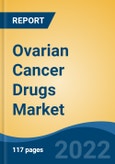Speak directly to the analyst to clarify any post sales queries you may have.
10% Free customizationThis report comes with 10% free customization, enabling you to add data that meets your specific business needs.
Growing Prevalence of Ovarian Cancer
The market for ovarian cancer drugs is growing in a highly favourable environment due to the recent increase in ovarian cancer cases. The American Cancer Society reports that in 2016, there were approximately 22,280 new instances of ovarian cancer diagnosed, resulting in 14,240 fatalities in the United States. Ovarian cancer accounted for 1.3% of the incidence rate and 2.4% of all fatalities attributable to cancer in 2016, according to statistics from the Surveillance, Epidemiology, and End Results (SEER) Program of the National Cancer Institute. There will be 23,820 new cases of ovarian cancer recorded in 2020, and the American Cancer Society believes that 1 in 75 women will get ovarian cancer during their lifetimes, with a 1 in 100 risks that she will pass away from it. As of 2017, 1,580 new ovarian cancer cases are anticipated to have been detected, making about 2.5% of all new cancer cases in the nation, according to the Australian Government's Cancer Australia. 1,047 fatalities are anticipated because of this in 2017. Therefore, it is anticipated that the ovarian cancer drugs sector will soon experience significant growth in developed nations.Increasing Elderly Female Population
The increase in the percentage of the elderly female population is expected to boost the global ovarian cancer drugs market during the forecast period. As the population of old females increases, they are projected to be suffering from more gynecological problems. For instance, according to the World Population Prospects, there were about 9.5% females above the age group of 60 years as of 2021, from which most of the female population are susceptible to gynecological infections or diseases or cancer. Ovarian cancer prevalence is often low in women under the age of 40. Most of the ovarian cancer cases are observed among women 60 years of age and older, according to the American Cancer Society. 7,378 new cases of ovarian cancer were reported in the nation in 2014, with approximately 53% of those cases being identified in women 65 years of age and older, according to Cancer Research UK.Increasing Research & Development Activities to Develop Ovarian Cancer Drugs
The growing prevalence of ovarian cancer has made the companies operating in the market along with different research organizations to increase their research & development activities in order to develop a potential drug treatment for ovarian cancer. Companies in the pharmaceutical business are increasingly coming up with novel drug combinations to treat ovarian cancer. To treat complex medical diseases, combination medications combine two or more active pharmaceutical ingredients (APIs) into a single dosage form. To lower manufacturing costs, boost compliance and efficiency, enhance medication concordance, increase profitability, and lessen side effects, pharmaceutical companies in the ovarian cancer medications market are investing in the research and development of novel products such as combination drugs. For instance, Roche's well-known tranquilizer Avastin (bevacizumab), which is used to treat advanced stage (III or IV) ovarian cancer, is a combination drug approved by the FDA that contains ingredients like carboplatin and paclitaxel.Market Segmentation
The global ovarian cancer drugs market is segmented into by drug class, by tumor type, by distribution, by region. Based on by drug class, the market can be fragmented into alkylating agents, mitotic inhibitors, antirheumatics, antipsoriatics, VEGF/VEGFR Inhibitors, PARP Inhibitors, antineoplastics and others. Based on tumor type, the market can be categorized into epithelial ovarian cancer, ovarian low malignant potential tumor, germ cell tumor, sex cord-stromal tumor. Based on distribution channel, the market can be fragmented into hospital pharmacies, retail pharmacies, online pharmacies. Regionally, North America dominated the market among Europe, Asia Pacific, Middle East & Africa and South America. The United States held the biggest market in North America region and is expected to be a lucrative market in the forecast period as the government is investing in research for new drugs for the easy detection of ovarian cancer for the affected people.Market Players
AstraZeneca, Plc., GlaxoSmithKline, Plc., Merck & Co., Clovis Oncology, Inc., F. Hoffmann-La Roche AG, Bristol-Myers Squibb Co., Eli Lilly and Company, Amgen Inc., C.H. Boehringer Sohn Ko. KG, Novartis AG are some of the leading players operating in the global ovarian cancer drugs market.Report Scope:
In this report, global ovarian cancer drugs market has been segmented into following categories, in addition to the industry trends which have also been detailed below:Ovarian Cancer Drugs Market, By Drug Class:
- Alkylating Agents
- Mitotic Inhibitors
- Antirheumatics
- Antipsoriatics
- VEGF/VEGFR Inhibitors
- PARP Inhibitors
- Antineoplastics
- Others
Ovarian Cancer Drugs Market, By Tumor Type:
- Epithelial Ovarian Cancer
- Ovarian Low Malignant Potential Tumor
- Germ Cell Tumor
- Sex Cord-Stromal Tumor
Ovarian Cancer Drugs Market, By Distribution Channel:
- Hospital Pharmacies
- Retail Pharmacies
- Online Pharmacies
Ovarian Cancer Drugs Market, By Region:
- North America
- United States
- Canada
- Mexico
- Europe
- Germany
- France
- United Kingdom
- Spain
- Italy
- Asia Pacific
- China
- India
- Japan
- South Korea
- Australia
- South America
- Brazil
- Argentina
- Colombia
- Middle East & Africa
- South Africa
- Saudi Arabia
- UAE
Competitive Landscape
Company Profiles: Detailed analysis of the major companies present in global ovarian cancer drugs market.Available Customizations:
With the given market data, the publisher offers customizations according to a company’s specific needs.This product will be delivered within 1-3 business days.
Table of Contents
Companies Mentioned
- AstraZeneca, Plc.
- GlaxoSmithKline, Plc.
- Merck & Co.
- Clovis Oncology, Inc.
- F. Hoffmann-La Roche AG
- Bristol-Myers Squibb Co.
- Eli Lilly and Company
- Amgen Inc.
- C.H. Boehringer Sohn Ko. KG
- Novartis AG








